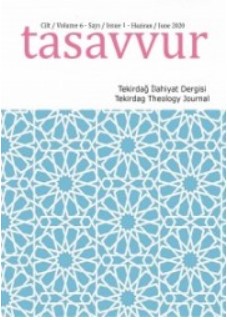مدرسة البصرة الحديثية في النصف الأول من القرن الأول الهجري: دراسة في أسباب التأخر العلمي عن مدرسة الكوفة
The Basran School of Hadith in the First Half of the First Hijri Century: A Study of Why Kufan Knowledge Surpassed Basran Knowledge
Author(s): Ahmad SnoberSubject(s): Local History / Microhistory, Islam studies, 6th to 12th Centuries, History of Religion
Published by: Tekirdağ Namık Kemal Üniversitesi İlahiyat Fakültesi
Keywords: al-Basra; First Hijri century; alhadith; jurisprudence; marrations; Abu Musa al-Ashari; Imran ibn Husayn; Ibn Abbas; Ibn Masud;
Summary/Abstract: This paper focuses on the probable reasons of Kufan knowledge surpassing Basran knowledge in jurisprudence and Hadith in the first half of the first Hijri century despite some of the prominent learned companions having stayed in Basra for many years. Most importantly, Abu Musa al-Ash'ari having remained in Basra for 12 years and Abdullah Ibn Abbas for approximately four years; both of whom were well known to narrate many ahadith and were strong jurisprudentially. Despite this, they did not have the effect that Abdullah ibn Masud had in Kufa. My approach is to analyze many of the narrations of the companions who stayed in Basra with a focus on the scholarly relationship between the companions and the tabieen (followers) while simultaneously comparing it to Kufa which is similar geographically and in its foundation as a city. The main point of comparison is the scholarly effect of the Sahaba and the scholarly activity of the tabieen. This paper focuses on the probable reasons of Kufan knowledge surpassing Basran knowledge in jurisprudence and Hadith in the first half of the first Hijri century despite some of the prominent learned companions having stayed in Basra for many years. Most importantly, Abu Musa al-Ash'ari having remained in Basra for 12 years and Abdullah Ibn Abbas for approximately four years; both of whom were well known to narrate many ahadith and were strong jurisprudentially. Despite this, they did not have the effect that Abdullah ibn Masud had in Kufa. My approach is to analyze many of the narrations of the companions who stayed in Basra with a focus on the scholarly relationship between the companions and the tabieen (followers) while simultaneously comparing it to Kufa which is similar geographically and in its foundation as a city. The main point of comparison is the scholarly effect of the Sahaba and the scholarly activity of the tabieen.
Journal: Tasavvur Tekirdağ İlahiyat Dergisi
- Issue Year: 6/2020
- Issue No: 1
- Page Range: 433-485
- Page Count: 53
- Language: Arabic

